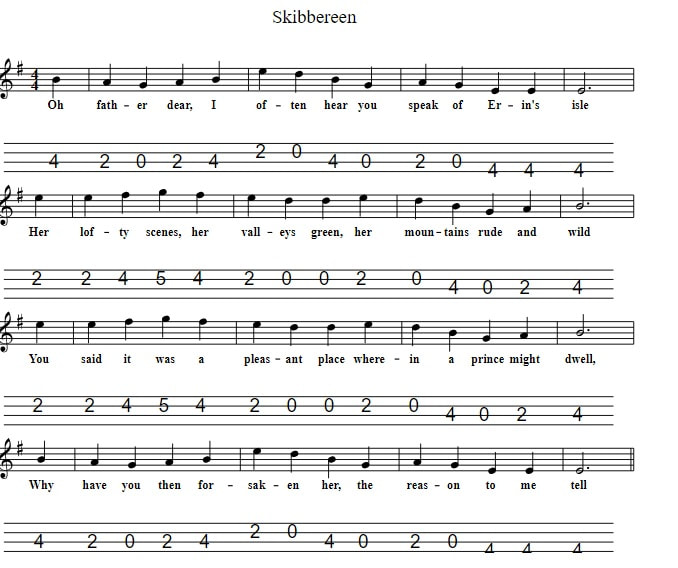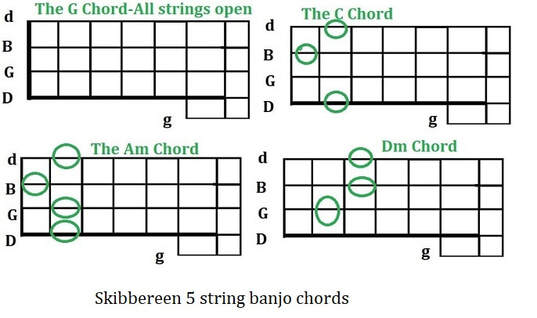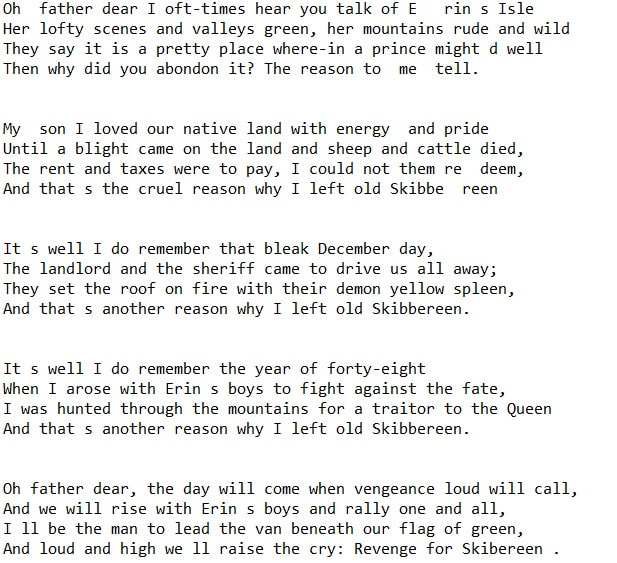Dear Old Skibbereen Irish Song Lyrics and guitar chords
Skibbereen tenor guitar / mandola tab in CGDA tuning. This song regarding The Great Hunger [ so called Famine ] was written by Patrick Carmenter.The chords for the 5 string banjo are included.The song was recorded by The Wolfe Tones and The Irish Brigade. To play along with the Irish Brigade use a capo on the 3th fret. Lyrics vary in some parts. The guitar chords are in chordpro.
(Am)Oh (G)father dear I (Am)oft-times (C)hear you (G)talk of (Dm)E(Em)rin´s (Am)Isle
Her lofty (C)scenes and (Am)valleys (Em)green, her (Am)mountains (C)rude (Dm)and (Am)wild
They say it (C)is a (Am)pretty (Em)place where-(Am)in a (C)prince (Dm)might (Am)d´well
Then (G)why did you (Am)abondon (C)it? The (G)reason (Dm)to (Em)me (Am)tell.
(Am)My (G)son I loved our (Am)native (C)land with (G)ener(Dm)gy (Em)and (Am)pride
Until a (C)blight came (Am)on the (Em)land and (Am)sheep and (C)cat(Dm)tle (Am)died,
The rent and (C)taxes (Am)were to (Em)pay, I (Am)could not (C)them (Dm)re(Am)deem,
And (G)that´s the cruel (Am)reason (C)why I (G)left old (Dm)Skib(Em)be(Am)reen
It´s well I do remember that bleak December day,
The landlord and the sheriff came to drive us all away;
They set the roof on fire with their demon yellow spleen,
And that´s another reason why I left old Skibbereen.
It´s well I do remember the year of forty-eight
When I arose with Erin´s boys to fight against the fate,
I was hunted through the mountains for a traitor to the Queen
And that´s another reason why I left old Skibbereen.
Oh father dear, the day will come when vengeance loud will call,
And we will rise with Erin´s boys and rally one and all,
I´ll be the man to lead the van beneath our flag of green,
And loud and high we´ll raise the cry:´Revenge for Skibereen´.
Included below are the chords for the 5 string banjo as used above
Skibbereen tenor guitar / mandola tab, tuned CGDA
The 1848 rebellion was the result of many factors. One was hunger -- the potato blight drove food prices beyond the reach of common people; in the end, millions died and many more went to America.
Another was land hunger; the preceding decades had forced many Irish smallholders off their lands while allowing the rich (usually English) to enlarge their holdings.
By the time of the blight, most Irish were working holdings of five acres or less; there simply wasn't enough land for the population.
Finally, revolution was in the air; almost all of Europe (except England) was in turmoil.
Unfortunately for the rebels, the very factors that caused the revolt meant that it had no strength and could gain no foreign help.
And England, with a stable government at home and all her enemies distracted, could deal with the rebellion at its leisure.
Another was land hunger; the preceding decades had forced many Irish smallholders off their lands while allowing the rich (usually English) to enlarge their holdings.
By the time of the blight, most Irish were working holdings of five acres or less; there simply wasn't enough land for the population.
Finally, revolution was in the air; almost all of Europe (except England) was in turmoil.
Unfortunately for the rebels, the very factors that caused the revolt meant that it had no strength and could gain no foreign help.
And England, with a stable government at home and all her enemies distracted, could deal with the rebellion at its leisure.




